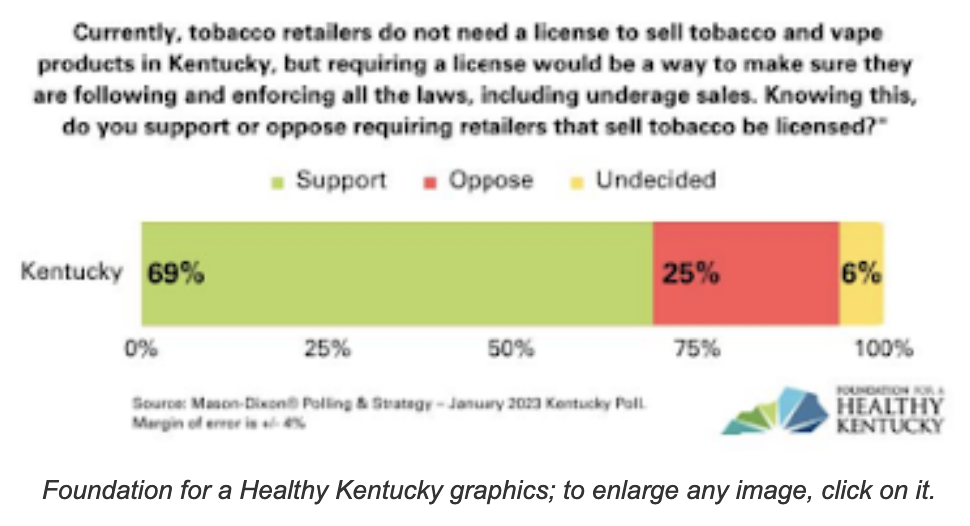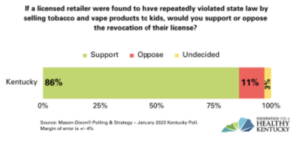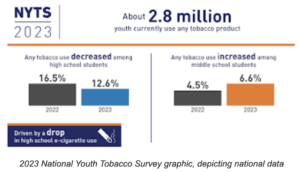Most Kentucky adults favor requiring licenses to sell tobacco and vape products, and revoking licenses of repeat sellers to minors

Most Kentucky adults support the idea of licensing retail stores to sell tobacco and electronic-cigarette products, and revoking the licenses of repeat offenders who sell the products to minors, according to a Foundation for a Healthy Kentucky poll taken Jan. 18-23.
Asked if they support or oppose requiring retailers that sell tobacco to be licensed, more than two-thirds of (69%) said they support the idea, 25% said they opposed it, and 6% said they were undecided.
The question posed to them was, “Currently, tobacco retailers do not need a license to sell tobacco and vape products in Kentucky, but requiring such a license would be a way to make sure they are following and enforcing all the laws, including underage sales. Knowing this, do you support or oppose requiring retailers that sell tobacco to be licensed?”
 Then they were asked, “If a licensed retailer were found to have repeatedly violated state law by selling tobacco and vape products to kids, would you support or oppose the revocation of their license?”
Then they were asked, “If a licensed retailer were found to have repeatedly violated state law by selling tobacco and vape products to kids, would you support or oppose the revocation of their license?”
To this question, 86% of the respondents said they would support such licenses being revoked; 11% said they would oppose it; and 3% were undecided.
The poll report said, “Data shows licensing requirements for tobacco products reduces youth tobacco-initiation rates, usage of tobacco and electronic products, and allow cities to monitor compliance with tobacco control laws.”
 The 2023 National Youth Tobacco Survey, released Nov. 3, shows that the nationwide effort to decrease youth tobacco and vaping rates is making some progress.
The 2023 National Youth Tobacco Survey, released Nov. 3, shows that the nationwide effort to decrease youth tobacco and vaping rates is making some progress.
“Among U.S. high-school students, current overall tobacco-product use declined during 2022-23 (16.5% to 12.6%),” the report said. “This decline was primarily driven by e-cigarettes (14.1% to 10.0%), which translates to 580,000 fewer high school students who currently used e-cigarettes in 2023. Among high school students, declines were also observed during 2022-2023 for cigars and overall combustible tobacco smoking, representing all-time lows.”
Further, the survey found, “In 2023, 10.0% of high-school students and 4.6% of middle-school students used e-cigarettes during the past 30 days. From 2022 to 2023, a significant decline in current e-cigarette use occurred among high-school students . . . while no statistically significant change occurred among middle-school students,” whose usage was much lower than that of high-school students, according to a Centers for Disease Control and Prevention report.
The NYTS report said, “Sustained public health monitoring with implementation of evidence-based tobacco control strategies, including effective youth interventions, media campaigns, Food and Drug Administration regulations, and other proven tobacco-prevention policies might further reduce youth tobacco-product use.”
The latest tobacco-use data for Kentucky is from the 2021 Youth Risk Behavior Survey. It found that 4.9% of the state’s high-school students said they currently smoked cigarettes and 21.9% said they currently used electronic vapor products. Among middle schoolers, the report found 1.6% of them said they currently smoked cigarettes and 13.8% of them currently used an electronic vapor product.
In such surveys, “current use” is considered having used a tobacco product on at least one day during the 30 days prior to the survey.
The foundation’s survey was conducted by Mason-Dixon Polling & Strategy as part of a Kentucky poll. It surveyed a random sample of 625 registered Kentucky voters via landline and cell phone, giving it a margin of error of plus or minus 4 percentage points.
11/6/23 Correction: The story incorrectly attributed the 2023 National Youth Tobacco Survey with a quote that correctly should have been attributed to the Foundation for a Healthy Kentucky poll report: “Data shows licensing requirements for tobacco products reduces youth tobacco-initiation rates, usage of tobacco and electronic products, and allow cities to monitor compliance with tobacco control laws.”